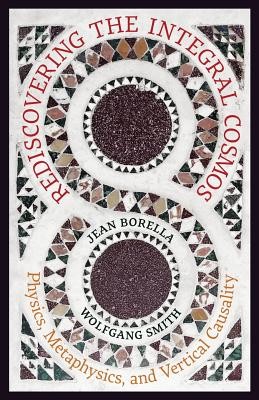
- We will send in 10–14 business days.
- Author: Jean Borella
- Publisher: Angelico Press
- Year: 2018
- ISBN-10: 1621384071
- ISBN-13: 9781621384076
- Format: 14 x 21.6 x 1 cm, minkšti viršeliai
- Language: English
- SAVE -10% with code: EXTRA
Reviews
Description
When a physicist who becomes a metaphysician, and a metaphysician who studies physics, join together to deal philosophically with science (quantum physics and cosmogenesis in particular), explosive results might well be expected—and this pivotal text does not disappoint. Co-author Jean Borella, professor of philosophy and metaphysics, also earned a degree in physics. And in co-author Wolfgang Smith we have a professor of mathematics and physics who became a metaphysician. Smith explores the implications of what he terms “vertical causality,” a hitherto unrecognized mode of causation which proves to be the missing ingredient needed to make sense out of quantum physics. He explains how vertical causality brings to light the long-forgotten fact that the integral cosmos replicates the corpus/anima/spiritus constitution of man; and, moreover, that this cosmic trichotomy proves essential both to a recovery of traditional cosmology and to the advancement of contemporary science. Finally, he shows on scriptural grounds that the trichotomous cosmology accords with the teachings of Christ. Still, it was necessary for philosophy to try to explain how and why science became atheistic in the first place; and this is just what Jean Borella has undertaken in his “Is Science Through with God?” Whether we follow Borella or Smith, we return to a Weltanschauung that can finally account for the world in all its dimensions, and, especially, find its meaning—a meaning weakened by several centuries of mechanical determinism.
EXTRA 10 % discount with code: EXTRA
The promotion ends in 21d.06:02:28
The discount code is valid when purchasing from 10 €. Discounts do not stack.
- Author: Jean Borella
- Publisher: Angelico Press
- Year: 2018
- ISBN-10: 1621384071
- ISBN-13: 9781621384076
- Format: 14 x 21.6 x 1 cm, minkšti viršeliai
- Language: English English
When a physicist who becomes a metaphysician, and a metaphysician who studies physics, join together to deal philosophically with science (quantum physics and cosmogenesis in particular), explosive results might well be expected—and this pivotal text does not disappoint. Co-author Jean Borella, professor of philosophy and metaphysics, also earned a degree in physics. And in co-author Wolfgang Smith we have a professor of mathematics and physics who became a metaphysician. Smith explores the implications of what he terms “vertical causality,” a hitherto unrecognized mode of causation which proves to be the missing ingredient needed to make sense out of quantum physics. He explains how vertical causality brings to light the long-forgotten fact that the integral cosmos replicates the corpus/anima/spiritus constitution of man; and, moreover, that this cosmic trichotomy proves essential both to a recovery of traditional cosmology and to the advancement of contemporary science. Finally, he shows on scriptural grounds that the trichotomous cosmology accords with the teachings of Christ. Still, it was necessary for philosophy to try to explain how and why science became atheistic in the first place; and this is just what Jean Borella has undertaken in his “Is Science Through with God?” Whether we follow Borella or Smith, we return to a Weltanschauung that can finally account for the world in all its dimensions, and, especially, find its meaning—a meaning weakened by several centuries of mechanical determinism.


Reviews